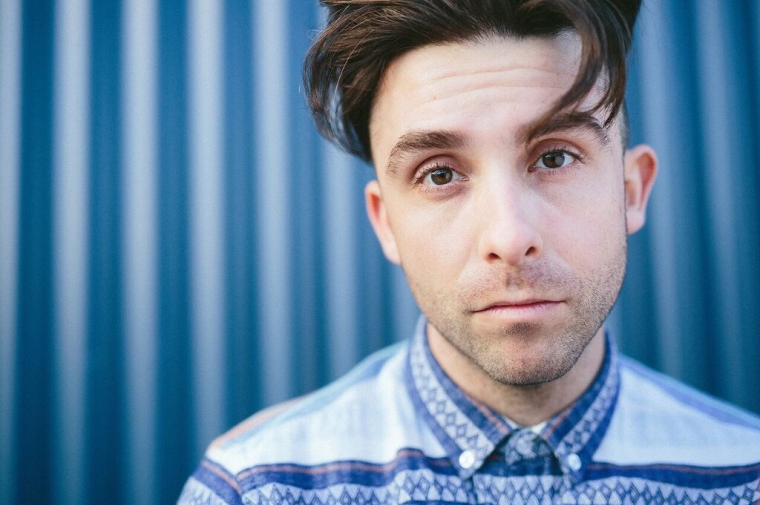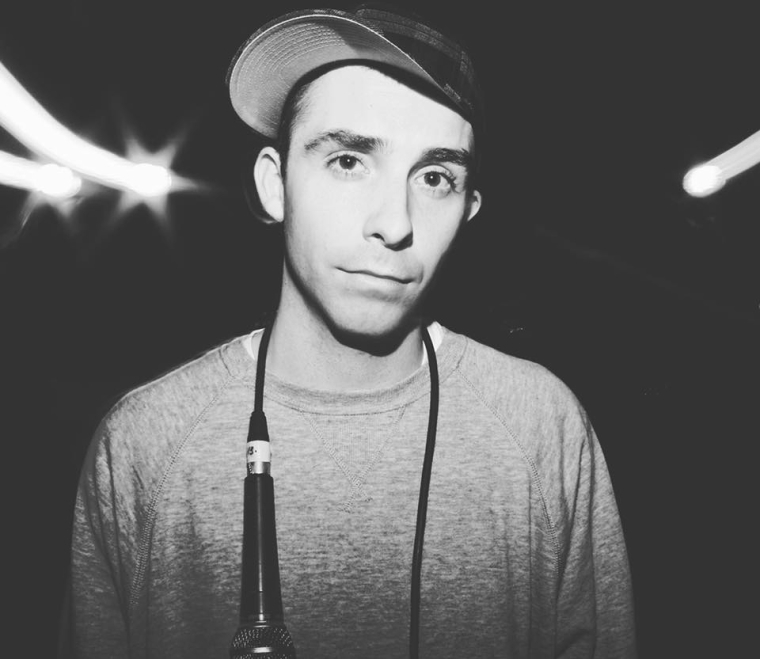Australia just keeps on producing artists that are forces to be reckoned with on the global music scene, and in the case of Brendan Tuckerman, or simply Tuka, no exception has been made. More commonly known as a member of hit band Thundamentals, Tuka has been doing some soul-searching, generating his fourth solo EP ‘Alive Death Time Eternal’ as a dedication to his fans and headlining a bunch of shows around Australia throughout April 2016 to celebrate its release. FIB had an exclusive chat with him and there is certainly a complex undercurrent to his music making.

Who have been your biggest influences musically?
I’ve been making music since I was a kid, so the inspirations I take kind of change and move. When I was making the last record I was listening to a lot of James Blake, I love him. Kendrick and Drake were more of the hip-hop influences, but I also like Bill Withers. I’ve collected a lot of vinyl in my time. I love that old sort of stuff.
I also draw influence from people around me who may not be musical, such as directors like Stanley Kubrick and David Lynch, and then there’s my mum and even some crazy taxi driver that I met who said something profound to me. Those are all influences that I consciously use in my music if they’ve struck me. Just because I work in audio doesn’t mean that I’m restricted by the kind of influences that I take artistically.
Is creating music that is extremely unique from what other artists are putting out there very important to you?
I guess. That’s what every artist kind of strives for. I don’t know if I do it, but it is important to maintain originality. At the same time it’s so hard to be original in this day and age. Every idea has been done. The only thing you can really do is be yourself and that will manifest originality because you’re the only you.
What is your greatest motivation to create?
Honestly, I couldn’t tell you. I’ve thought about it heaps, it drives me insane! Like, I just have to do it. I really respect artists that don’t need recognition, that just do it anyway. I’ve always felt like everyone is born with a talent and often those talents aren’t fostered and they’re taken for granted. I was really lucky enough to figure out early on that my talent is actually ambition. I’m not that good at anything in particular, but I’m just so driven to create things that I dedicate my whole self and my spirit energetically to doing so.
How do you think that growing up in the Blue Mountains influenced your music career?
I guess I was isolated; I lived at the end of a really long dirt road on the side of a cliff. My Mum was super relaxed about what I wanted to do and has always been really supportive. She didn’t have a problem with me telling her that I was going to be a rapper and move to Sydney. I’m sure a lot of parents probably would. I was really lucky to be in an isolated place with a loving mother and a community of other musicians with fans and a venue that would let us play. It was one of those hubs; every now and again you would get those scenes in weird areas, you know what I mean? Unfortunately it’s not as potent as it used to be. I really do wish that more music would come out of the Blue Mountains because when I was growing up there, there were just so many musicians.

You had an extremely busy time touring toward the end of 2014 and into early last year; how have you managed to juggle all of that with preparation for this upcoming tour?
I just love it that much that it’s not that bad. This isn’t work to me. I’m really lucky to be able to make music full-time. I was a tafe teacher for a couple of years before music really worked for me. It’s all to do with passion and to be lucky enough to be able to do what I do. I looked in my diary a couple of months ago and realised that I actually haven’t had a day off in over six months!
What did you teach at tafe out of curiosity?
I taught ex offenders. It was pathways to employment and education for minority groups. So people that had become citizens who were previously refugees, or high anxiety kids with really rich parents in North Sydney or just people that don’t have a lot of voice. I worked in a part of a faculty called outreach, so we got really interesting people to work with. It was really fulfilling but also very grounding. I’d tour on the weekends still but then come back to a job where these guys really don’t care if I’m some kind of musician or B-grade celebrity, because they’ve got real issues that need addressing. Like, one day I’d be in front of a crowd of a thousand and the next I’d be with this dude who had lost everything, so it was very grounding.
Do you feel that your solo stuff and the music that you produce as Thundamentals influence one another?
Every now and then I’ll be writing for my own stuff and I’ll think, “This will work better with Thunda’s”, but essentially we keep it pretty separate. We’re on different album cycles for one, but the biggest reason I do solo stuff is to contribute more to Thundamentals. I know that sounds weird, but I go away and I collaborate with people that I would never normally collaborate with. I find it more challenging to write on my own because I take up more roles. I then bring new information and techniques back to the Thundamentals records. So the solo stuff just really helps to keep me sharp. It’s super challenging and I really think that it’s good for your brain and good for your life to challenge yourself rather than to just stick with the regular norms of what’s safe and what’s easy.
Is there anything that you can tell us about your upcoming project with Thundamentals once this tour is over?
I can’t tell you too much, but I’m so excited. We toured for almost two years solid and there just wasn’t enough time to write together then. We have been hanging out heaps lately and just really connecting as a band so I think this is going to be the biggest thing we’ve ever done to tell you the truth. But at this stage I can’t say anything more.
In one of your more personal interviews you mentioned coping with the conditions dyslexia and synaesthesia. Do you feel limited by these differences or do you think that they’ve actually contributed to your ability to create?
That’s a funny question. The dyslexia has really limited me, not even just in high school and stuff. I never knew that the world was going to be so text-based. If you think about it, social media is mostly text based. So everything that I post on social media, I have to read a thousand times and there will still be errors. It’s hard to convey that you know what you’re talking about when you can’t spell! Or I will read things and the words get jumbled. The beauty of it all is that while I was at high school I had to figure out different ways of doing things and it contributed to the way that my brain is probably a little different. For song writing, that’s perfect because you don’t want to hear things that are all done in the same way. Everyone writes a love song or a song about their pet or whatever. It’s the way you say it that makes it original. So the dyslexia has forced me to do things in a different way.
Synaesthesia is an interesting one, it’s just a gift really that hasn’t limited me at all. It’s amazing! It’s hard to describe to people, but when a song comes on, a chord progression or a rift will make me feel a colour. A couple of notes or chords into a song, I already know how I feel about it. It’s like a mood indicator. For instance, the song ‘Nirvana’ is emerald green. And as soon as I had the lyrics in my head, I knew it was green. I’m not a trained musician, so when I was working with the producer on the song, if it started to stray into yellows or blues I would bring it back and change the idea so that I could keep it in this emerald green place. It sounds insane, but it just helps me. It helps me keep clearer with my tone of voice and the heartbeat or the rhythm of the song. It hasn’t been a disability at all really. It’s been amazing.
What advice would you have for other aspiring artists, particularly ones who feel limited by their own struggles?
I guess that having influences is great and showing those influences in what you put out is great, but at the end of the day you really have to take responsibility for you and really honour you because that’s the most original thing you’ve got. The day I stopped emulating the people that I really admired and just started being honest with myself in my music was when people started paying attention. It was almost overnight. As soon as I put out a couple of songs that came out of me naturally and weren’t forced, people actually started to care. A true artist, I feel, isn’t doing it for recognition. They’re not doing it because it’s cool or because it’s going to make them money. At the end of the day you really need to be doing it because you love it, and that will show in your work.
Tuka has steadily established himself on the world music scene through pure dedication and an incredibly unique and unparalleled approach to his music-making. To say that his sound is both mesmerizing and articulate would be a pale description, but finding the words to describe something that can give you shivers, relax you, inspire you and induce euphoria is as difficult as his music is breathtaking. Be sure to have a listen or even get yourself along to one of his shows in his ‘Don’t Wait Up’ tour happening throughout Australia in April 2016. We’re sure that once you hear what this almighty artist is offering, his songs will gain a permanent position among your daily rotation of music.







